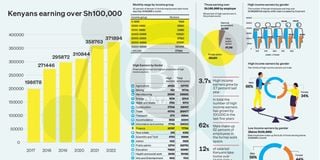
GRAPHIC | CHRISPUS BARGORETT | NMG
|Business
Premium
Kenyans on Sh100,000 pay grow slowest in five years
The number of Kenyans earning more than Sh100,000 monthly grew by the slowest pace in at least five years, pointing to a tough business environment that depressed earnings, investments, and job creation.
New data from the Kenya National Bureau of Statistics (KNBS) shows that salaried workers who take home more than Sh100,000 increased by 13,131 or 3.7 percent last year. This was the slowest growth since 2018 when the revised data on wage employment is publicly available.
Wage employment counts those serving on a regular basic salary contract including permanent staff, casual employees, part-time workers, directors, and partners.
The drop points to a tough business environment that was aggravated by various shocks, including a crippling drought, a weak shilling, higher taxes, the Russia-Ukraine war, and the lingering effects of the Covid-19 pandemic.
A protracted electioneering period also roiled the economy last year with investors taking a wait-and-see approach.
Jacqueline Mugo, the executive director of the Federation of Kenya Employers, said the data reflects the distress that enterprises are undergoing.

GRAPHIC | GENNEVIEVE AWINO | NMG
“The high cost of doing business has led to either a stagnation or shrinking of businesses as they struggle to stay afloat,” Ms Mugo said.
“There have been few wage reviews or wage increases or new hires into high-paying positions,” she added. The number of new top earners, going by available data, seems to have peaked in 2018 when there was an additional 72,768 workers, a 36.6percent growth that took the tally of those pocketing more than Sh100,000 in a month to 271,446.
In 2018, the economy recovered from the drought in the previous year and protracted electioneering that saw Kenyans go to the polls twice after retired President Uhuru Kenyatta’s win was nullified by the Supreme Court.
It grew by a slower rate of 24,426, or nine percent, in 2019.
In 2020, the number of wage employees taking home more than Sh100,000 grew by 14,972 to 310,844.
Growth picked up in 2021, with businesses creating 47,919 new top earners as the economy began to recover from Covid-19.
However, drought, and the war in Ukraine that disrupted the global supply chains of critical inputs like oil, fertiliser, and grains as well as the 2022 electioneering combined to slow down the economy again.
In total, there were 3,015,481 wage employees last year, an increase of 3.8 percent from 2,906,071 in 2021.
“The economy has been slowing down pretty much for the last seven years. This captures it very well,” said Ken Gichinga, an economist.
Mr Gichinga noted that with a big chunk of tax revenues going to service debt, the money supply in the economy is reduced, thus affecting consumption and investment that can spur growth.
Having a lot of workers taking home more than Sh100,000 points to a robust consumer class that is likely to have enough disposable income to spend on luxurious items such as entertainment, thus boosting the economy.
There were more new wage employees created in 2021, 163,442, compared to 109,410 in 2022.
The education sector has the largest number of premium employees, with 79,825 taking home more than Sh100,000 in a month. It is followed by the health, wholesale, and financial sectors. Kenya’s economy grew 4.8 percent last year, down from 7.6 percent a year earlier, as a severe drought hurt agricultural output.
Perhaps the worst shock for businesses was high inflation, which touched a five-year high of 9.6 percent in October as businesses and households grappled with high prices of food and fuel.
Inflation, a measure of the cost of living over 12 months, wiped out the 5.6 percent salary increase offered to the private sector workers last year, making it the third year in a row when pay rises lagged the soaring cost of living. “If 2022 is showing this trend then know that 2023 will be a lot worse,” said Kunal Ajmera, the chief operating officer at Grant Thornton Kenya, an audit firm.
This year, both employees and employers are facing higher statutory deductions, including the 1.5 percent housing levy that has reduced the take-home for most workers.
Compulsory monthly deductions might take at least 20.5 percent from Kenyans earning Sh50,000 and above when the State starts deducting 2.75 percent of gross monthly earnings to fund the universal health coverage, further shrinking the size of pay slips.
The FKE recently revealed that 70,000 jobs in the formal private sector were lost between October last year and November even as 40 percent of its members plan to downsize to cope with a tough business environment that has seen their operating costs rise due to new tax measures.
The Kenyan labour market is still dominated by workers in the informal sector whose pay is tiny and erratic. Most of them do not have job security, work without saving for retirement, and have no medical insurance.
Employers are warning it will take years for pay raises to return to pre-Covid levels, with firms fretting over business uncertainties despite the economic rebound following the easing of measures aimed at curbing the spread of the disease.





